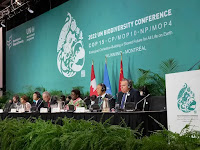Still the agreement breaks new ground in the era of the Sixth Great Extinction, generally considered by scientists to be the product of man's development and exploitation of natural resources. It provides for raising $200 billion by 2030, and another possible $500 billion by eliminating subsidies for Nature' protection. $20 billion annually will go to poor countries, double what they receive now. That figure will increase to $30 billion by 2030. Indigenous peoples' rights were explicit recognized for the first time with provisions for insuring they have a voice in decision making.
Tuesday, December 20, 2022
UN Biodiversity Conference Reaches Agreement
A historic agreement to protect what remains of the planet's biodiversity was reached in Montreal, Canada on Monday after extended negotiations among 190 participating nations. The COP-15 conference was chaired by China. It remains for individual nations to implement the agreement. It calls for 30% of land and water important for protecting biodiversity to be protected by 2030. Currently only 17% of terrestrial and 10% of marine habitats are protected. While conservationists are generally positive about the meeting's outcome, some fear it may not be enough and too late. Current extinction rates exceed by a thousand times greater than expected. The agreement delays prevention of species extinction and preserving genetic diversity within populations until 2050. [photo credit: AP]
